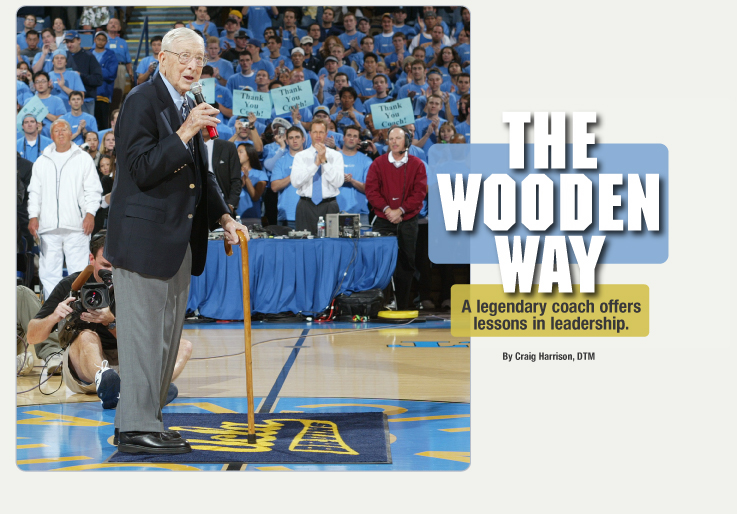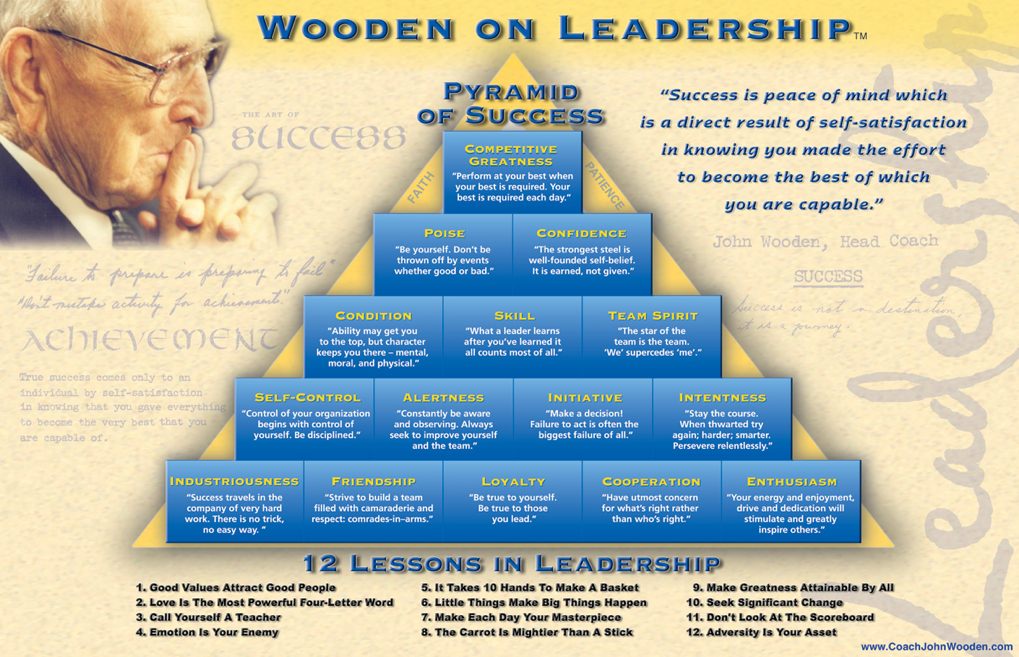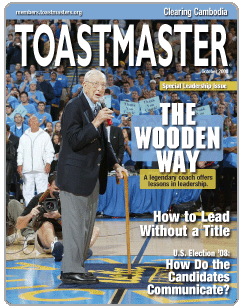|

Success is the peace of mind
which is a direct result of
self-satisfaction in knowing you did your best
to become the best that you were capable of becoming.
— John R. Wooden,
Head Basketball Coach, Emeritus, UCLA
When the greatest college basketball coach of all time, John Robert Wooden speaks, everyone listens! Recently Toastmasters interviewed the 97-year old retired UCLA basketball coach and first inductee of the Naismith Memorial Basketball Hall of Fame as both a player and a coach, on the topic of leadership. In a far-reaching discussion, Coach Wooden shared his wisdom on team-building, conflict resolution, recognition, adversity and the pursuit of excellence. His teachings are directly applicable to Toastmasters everywhere, be they officers or future officers (members).
LEADING AND MOTIVATING TEAMS
Toastmasters International has tens of thousands of members who are building their leadership and team-building skills as club and district officers. How can our leaders motivate people to do good work, and how can they motivate teams of people — be they Toastmasters volunteers, employees or some other kind of group — to work together toward a common goal?
JW: In my opinion, one of the greatest motivating tools we have is a pat on a back. It doesn't have to be a physical pat, it could be a smile, a nod. Everyone likes to be complimented in one way or another.
Another technique is listening. A leader must listen to those under their supervision. I believe that has been overlooked a lot. We don't know a thing that we haven't learned from somebody else in one way or another. And one of the ways we do that is by listening.
Toastmasters concurs. We use applause, pins, ribbons, certificates and achievement designations to figuratively pat members on the back. In terms of developing listening skills, we have a success-communication module on listening and actively focus on listening as part of our speech evaluation process.
ON LEADING VOLUNTEERS
Over the years you have recruited and coached talented scholarship players and walk-ons, and led paid assistants and interns. Discuss the challenge of leading volunteers.
JW: So much of success is just being sure that you give people credit. That doesn't mean you treat everybody equally, because everybody doesn't deserve the same treatment. And I think more partiality is shown by trying to treat everybody the same, than in any other way.
Every person under your supervision is different. They're all different. They're identical in most ways, but not in all ways. You have to study and analyze every individual under your supervision and try to work with them in a way that will be most productive.
TIPS FOR NEW LEADERS
Many Toastmasters members step or are thrust into leadership positions for the first time. What advice do you have for nascent leaders? Do you have tips on how they can build a cohesive team?
JW: The first thing is listening! Get ideas from them. Lead, don't drive. And give credit. Don't blame. If an officer on your team suggested something and it worked well, give them credit. If it doesn't work well, you take the blame because you made the decision. Always give them credit, never blame. Lastly, criticism must always be given in a gentle way, never harshly.
I had three rules as I progressed through the years, for my teams:
- Never be late. Always be on time. It's very important. Whether to practice, to the table, to the bus, to your classes, etc.
- You must never criticize a teammate. That's the leader's job. It's never your job.
- I would not tolerate profanity from anyone, anytime. I'd blow the whistle, pull you from the court and put you on the bench and talk to you before I would put you back in.
Coach's rules apply quite well to Toastmasters clubs and meetings!
PURSUIT AND PERPETUATION OF EXCELLENCE
Each year our districts strive to achieve and/or maintain levels of excellence. You coached for 16 years at UCLA before you won your first national championship. Ultimately, teams you coached won an NCAA-record 10! Which was harder, climbing the mountain to win your first national championship, or maintaining that level of excellence in subsequent years when you were the recognized king of the hill and expectations rose?
I think it's far more difficult to get to the top [the first championship]. You learn so much along the way, not only with working with other people, but other little things that can help you.
Toastmasters strive to achieve educational and membership milestones in their clubs, areas, divisions, districts and regions. As one who has won at every level and set records that likely will never be broken, what is your definition of success?
Too many people look on outscoring someone as winning, I never tried to get that across to my players. My bench never heard me mention winning. My whole emphasis was for each one of my players to try to learn to execute the fundamentals to the best of their ability. Not to try to be better than somebody else, but to learn from others, and never cease trying to be the best they could be; that's what I emphasized more than anything else.
THE PYRAMID OF SUCCESS

Reprinted with permission from coach John Wooden.
Your Pyramid of Success is an inspiration to men and women around the world. How did you develop this model of excellence?
JW: When I was an English teacher I found out some parents made their youngsters feel that they had failed if they didn't get an A or a B. I never liked that way to judge. Nor do I like Mr. Webster's definition of success, which is more or less the accumulation of material possessions or the achievement of a position of power or prestige. I don't question the accomplishments, but I don't think they necessarily indicate success.
I wanted to come up with something that I hoped would make me a better teacher, and give those under my supervision something with which to aspire, other than just higher marks in the classroom or more points in athletic endeavors.
I coined my own definition of success. I used what my father said: Never try to be better than someone else. Learn from others. I ran across a simple verse at that time that said:
At God's footstool to confess, a poor soul knelt and bowed his head. 'I failed' he cried. The master said 'though didst thy best. That is success.' "
From those I coined my own definition of success in 1934:
Success is peace of mind attained only through self-satisfaction in knowing you made the effort to become the best of which you are capable.
We aren't all equal as far as abilities and in many ways, our minds, our bodies. We are all equal in that respect. After a while I wasn't happy with [this definition]. My youngsters didn't seem to understand it very well. I felt I needed to come up with something you could see. So I started the Pyramid of Success, started it in 1934, completed it in 1948 when I was teaching at Indiana State University after being discharged from the US Navy in 1946.
Any structure must have a strong foundation. The cornerstones anchor the foundation. For some reason the cornerstones that I chose to begin with I never changed. I had a lot of ideas during those years. Changed some, dropped some, substituted something else, and other names could be used, but never the cornerstones.
I think anyone's success depends on working hard, Industriousness and Enthusiasm, enjoying what you are doing. You can't work your best if you're not enjoying what you are doing. No way you can force yourself to. Those were the first two.
At the apex I, of course, had success according to my definition. And gradually I built the rest of the blocks. Between the cornerstones I had Friendship, Loyalty and Cooperation. Then I went up to Self-Control, Alertness, Initiative and Intentness. Then I went up to Condition, Skill and Team Spirit. And those led up to Poise and Confidence. And it all went up to Competitive Greatness.
And then with Patience and Faith you can get to the top of the pyramid, which is my definition of success. They aren't blocks, but they lead to the apex.
Toastmasters has its own self-paced programs to master communication and leadership skills. We invite our members to apply the timeless principles of your Pyramid of Success in the attainment of our educational goals.
ON RESOLVING CONFLICT: COMMUNICATION IS THE KEY
What advice do you have for professionals in the work world, as well as for volunteer officers in Toastmasters clubs, in resolving team conflict?
JW: Certainly conflict will arise. I think you have to get both parties together and air everything out without trying to hold back anything, not be critical of either one, just try to listen to both sides, and find out what might be the trouble.And sometimes you'll find out it wasn't too much at all. And it can be worked out without too much of a problem. Unless a problem is brought to the forefront, it will just continue to fester.
CULTIVATING LEADERSHIP IN OTHERS
Over the years you've cultivated leaders on each of your teams and also on your coaching staffs. What advice can you give today's leaders about cultivating leadership in others?
JW: Make certain that you give those under your supervision credit. Make sure that they receive credit…very little criticism, but when there has to be some criticism, it must be done in a gentle way that will not be embarrassing, and definitely not in front of others. You may need to take them aside and talk it over, but never do so while you're mad. No yelling; it has to be done in a gentle fashion, and with a pat on the back is the best.
Toastmasters' evaluation process tempers criticism with praise and ensures critiques are done constructively. We give some evaluations publicly, others in writing, and encourage one-to-one conversations for certain feedback, so as to maintain the esteem of the recipient and avoid public embarrassment.
ON STRUGGLE AND DIFFICULTY
From time to time clubs struggle due to waning membership, personality conflicts or a dearth of leadership, to cite three possible challenges. Any advice for leaders facing adversity or struggle of some kind on their teams or in the clubs?
JW: Hardship brings people closer together if you share it. When I first came to UCLA we had to have basketball practice for the first 17years on the 3rd floor of the old gym with the gymnastics team on one side and wrestling squad on another most of the time. I grew closer to those two coaches than the others because we shared adversity. It was tough for us all. I think adversity brings us together.
Regular club officer and council meetings allow an opportunity to leaders to commiserate, regroup and pull together, teaming up to overcome adversity.
FOR CLUB PRESIDENTS: LISTENING AND LEADING WITH LOVE
What advice can you provide our thousands of club presidents — essentially the team captains— around the world, in terms of leading their squads of officers and members?
JW: Listen to your assistants (other officers). Let them talk. I wanted mine to have a definite part. Your officers should never be afraid to make a suggestion, but they should never be upset if the leader does not accept it. But if a leader does accept the idea and it works, give them credit for it. If you accept it and it doesn't work, you (as president) take the blame. But always give them credit and they will come up with other things that can be helpful. If you don’t give them credit you they will be reluctant to come with or suggest other things.
I also wanted my basketball players to know that I reallycared about them. Forget basketball; as a person, I cared, I cared about their family. I want to know each day: How's your mother? Did the job work out for your dad? Did your brother or sister get that position?
I think any leader should do this. You should really care. If you are fooling them they will catch on.
We know this to be true. We've spoken toand heard from your former players who, to this day, thirty or forty years later, confer with you, keep in touch with you, sharing their joys and pains, and care deeply for you, as you do for them.
ON PATIENCE:
What else would you like Toastmasters leaders to know in order to succeed?
JW: At the top of my pyramid: patience and faith! Leaders must have patience for those under your supervision. Don't expect too much too soon. Maybe it was easy for you, but that doesn't mean it's going to be easy for somebody else. Be sure you have patience.
And then, you must believe in what you're doing, that what you're doing is the proper thing, the right thing. And you must have faith that things will end up as they should, which doesn't mean as you want them to, but things will work out as they should. Providing of course, that you do the things that you should do to help that become that reality.
I think we are all guilty at times of wanting things to happen, but we do not do everything we are capable of to help that become a reality. We just want it to. And that's not life. That shouldn't be life.
Past District Governor Craig Harrison DTM, is a member of Lakeview Toastmasters (2767-57) in Oakland, CA. He is a former boys and girls high school basketball coach in the US and for the international non-profit Sports for Understanding, and the principal of the training firm Expressions of Excellence!™. www.ExpressionsOfExcellence.com
The John R. Wooden Global Leadership award
In June 2008, UCLA's Anderson School of Management launched the John Wooden Global Leadership Program, featuring fellowships, a leadership colloquia and curricula culled from the Coach Wooden's best practices over his 40-year coaching career. The inaugural John R. Wooden Global Leadership award was bestowed upon Starbucks chairman, president and CEO Howard Schultz, for his exemplary leadership style and service to the community.
Source: http://www.anderson.ucla.edu/x19968.xml
Wooden at the Microphone:
Tips for Speechmaking
- Many public speakers take too long on a certain point. I recall an outstanding basketball coach told me once many years ago "give a coach an opportunity to say something in ten minutes that he could have said in ten seconds, he'll do it!" You must not take too long. You'll lose attention.
- You must have various means to attract your audience's attention. Dr. Stephen R. Covey told me: "If you think you're losing it, make a mistake. The audience will say, 'oh, he's just like me. He makes mistakes too.' "
- Where you can, don't make it so terribly very serious. Your topic may be serious but have a little humor in there. I think that too keeps an audience's attention.
- Attention of the audience is very important. You've got to use various ways to keep audience attentive. Making fun of yourself is very important.
The Wisdom of Wooden
Coach John Wooden's wisdom, though often imparted to his players, is applicable to us all. Whether as coach, author, motivational speaker or teacher, coach Wooden dispensed sage advice. Among his pearls of wisdom:
"When I am through learning I am through."
"Be quick but don't hurry."
"Failure to act is often the biggest failure of all."
"Little things make big things happen."
"Effective leaders are, first and foremost, good teachers. We're in the education business."
"Mentors are available at all stages of your leadership life — early, middle and late. Seek them out and listen; absorb their knowledge and use it."
A good banker isn't careless with pennies;
a good leader isn't sloppy about details."
"Character is more important than any other leadership trait."
"Be at your best when your best is needed."
Wooden on Leadership, John Wooden and Steve Jamison
Wooden: A Lifetime of Observations and Reflections On and Off the Court, John Wooden and Steve Jamison
Wooden on Leadership, John Wooden and Steve Jamison
Wooden on Leadership, John Wooden and Steve Jamison
Wooden on Leadership, John Wooden and Steve Jamison
Wooden on Leadership, John Wooden and Steve Jamison
Wooden on Leadership, John Wooden and Steve Jamison
UCLA Newsroom article by Susanna Park, 5-28-08
Wooden on Leadership, John Wooden and Steve Jamison
Facts About Coach Wooden
Born: Martinsville, Indiana on October 14, 1910
- Led Purdue to national basketball championship in 1932 as a senior.
- Coached UCLA men's basketball teams to ten NCAA championships in twelve years (including seven in a row)
- Four perfect seasons (undefeated)
- His teams won 88 games in a row
- His teams won 38 straight NCAA tournament victories
- 40-year coaching career; 27 years as coach at UCLA. Winning percentage of .813
- Creator of The Pyramid of Success
- First inductee into the Naismith Memorial Basketball Hall of Fame as a player and a coach
- Awarded the Presidential Medal of Freedom
- Author of numerous books, including WOODEN: A Lifetime of Observations and Reflections, Wooden on Leadership and the children's book Inch and Miles: The Journey to Success.
|
![[Home]](../GIFs/LatestEofEHead.gif)

